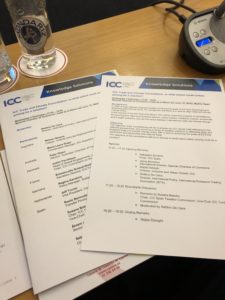
Climate change
ICC consultation at COP 25 considers value of carbon pricing schemes
On the sidelines of the United Nations Climate Change Conference (COP 25), ICC discussions considered the effectiveness of climate pricing schemes.
The fourth edition in ICC’s trade and climate consultation series took place on the sidelines of COP 25 at the headquarters of the Spanish Chamber of Commerce in Madrid. Following successive consultations on climate waivers, carbon clubs and border adjustment measures this edition, co-organised by ICC Spain, discussed the effectiveness of carbon pricing as a market-based approach for reducing greenhouse gases globally.
What is carbon pricing?
Stefano De Clara, Director of International Policy, International Emissions Trading Association (IETA) moderated the consultation, which featured stakeholders from business, government, and various international organisations. During his opening remarks, Mr De Clara provided a brief overview of existing carbon pricing schemes.
Mr De Clara emphasised the importance of creating climate policies that allow for trading and encourage collaboration between national governments. Currently, 57 national governments have implemented or scheduled emissions trading schemes or carbon taxes around the world. One of the key drivers for the recent uptake in carbon pricing policies has been the Paris Agreement, which requests nationally determined contributions (NDCs) from each country, according to Mr De Clara.
Following Mr De Clara’s opening Susana Bokobo, President of ICC Spain’s Tax Commission and Global Tax Leader for the Spanish energy company Repsol, outlined the consequences associated with the implementation of carbon taxes, including higher costs for both business and consumers. Ms Bokobo offered her support for carbon markets yet cautioned that a fractured system without global cooperation could lead to carbon leakage, or the off-shoring of carbon intensive operations to countries where there is no price on emissions.

Addressing ‘carbon leakage’
As part of the consultation’s roundtable discussion, other participants echoed similar concerns over carbon leakage. While several countries and companies have introduced carbon emissions trading systems many participants believe that linkages will be critical in reducing carbon leakage over time.
Abyd Karmali, Managing Director, Climate Finance at Bank of America, explained that businesses are already creating linkages through the implementation of carbon offset purchase programmes. Typically, these measures are uniformly applied by businesses and financial institutions across markets around the world. Regardless of the existence of a national carbon pricing scheme, businesses are applying the same carbon standards wherever they operate. Likewise, Ms Bokobo, mentioned Repsol’s recent net-zero CO2 emissions target for 2050 as an example of business connecting carbon policies across markets.
In addition, Daniel Ramos, Legal Officer at the Trade and Environment Division of the World Trade Organization, raised the availability of data for small- and medium-sized enterprises (SMEs) and developing economies as another area for potential carbon leakage. Before implementing carbon pricing regimes, it’s critical for national governments to accurately determine the price of all economic activities.
Business leadership for market-based solutions
For carbon pricing to work, Jeff Turner, Vice President of Sustainability, Royal DSM, emphasised that there needs to be a very strong business voice to policymakers to stop hesitating. As a key architect of the World Bank’s Carbon Pricing Leadership Coalition [CPLC], a collection of senior executives from leading global companies and former high-level government officials in favour strong carbon prices, Mr Turner said: “We need to lift up the pace [of climate action] – urgently.”
ICC endorsed a report published by CPLC’s High-Level Commission on Carbon Pricing and Competitiveness at the United Nations General Assembly in September. ICC’s backing of the report was recently mentioned in the Financial Times as part of a special report on climate change ahead of this year’s COP.

ICC at COP 25
Working with policymakers, business leaders and other stakeholders, ICC is advocating for policy frameworks that address the urgent need to keep the global temperature increase below 1.5°C and transition to an inclusive and sustainable net-zero emissions future.
From daily business briefings to high level negotiations, find out how ICC is mobilising business leaders at COP25 in Madrid.
Read ICC’s key messages and 7 essential reads for COP 25.
